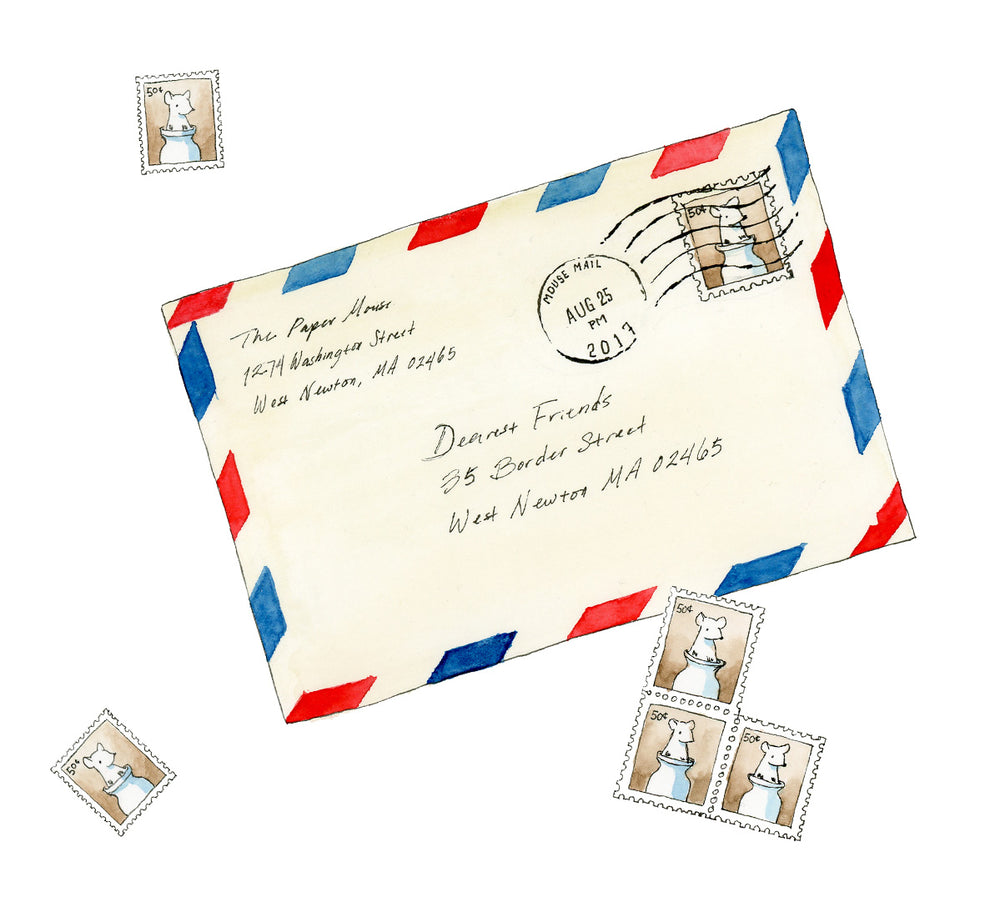What to Write during Letter Writing Month

Back in 2001, the USPS designated the month of April National Letter Writing Month. The Paper Mouse team loves to celebrate this snail mail jubilee, and we encourage everyone to join in the fun of writing and receiving letters this month.
For some people, writing a letter comes as naturally as talking to a friend in person. For others it feels awkward and unfamiliar. There are so many quick and easy ways to communicate these days that we’re out of practice with the slow pace of a handwritten letter, and it can be intimidating to hold a one-sided conversation. When we’re not sure what to write we tend to report on the news in our lives: places we’ve been, things that we’ve done, big changes. But this has been a slow year for many of us, and by now there are few new changes to report on. So what do you put in a letter when there’s not apparently much to say?
In fact, there’s no limit to what can go in a letter! Some of the great letters in history have not been newsy at all, but rather have reflected the writer’s internal world—opinions, observations, ideas, interests. There’s no right or wrong subject matter for a letter. If you want to celebrate National Letter Writing Month this year but you’re having trouble thinking of what to write, here are some prompts that might spark an idea.
Write a review
We may be low on exciting news right now, but our opinions are always available to us - and we all love to share an opinion sometimes. Have you read a book, watched a show, listened to some new music lately? Share what you thought of these things. Did they inspire you, annoy you, make you reconsider a point of view? Would you recommend them to your correspondent?
You can “review” anything you have an opinion about, whether serious or tongue-in-cheek. Do you have strong opinions about a particular vegetable that you’ve eaten lately? About Daylight Saving Time? About current events? A letter is a perfect venue to give voice to your thoughts. Writing gives you time and space to share reflections that may not emerge the same way in spoken conversation. If something has been vexing or perplexing you or giving you joy lately, add it to your letter.
Practice observation and description
When we don’t have much going on in our lives, it’s a good time to exercise our powers of observation and description. Even the most trivial tidbit can be interesting to read about when it is well described. The behavior of our families, neighbors, and pets; the state of our homes; our daily routines; the changing seasons: all are material for close observation and detailed description.
Practice paying attention to small details. Have you eaten a particularly satisfying meal lately? Try to remember what flavors, textures, and smells made it so appealing. Can you find the words to paint a picture of it for your correspondent? Or perhaps you saw something that made you laugh. Can you retell the incident in your letter? We tend to think of the big changes in our lives as worthy of retelling and to forget small everyday events, but these are often the ones that add color to our days. Letters give us space to show, not tell, what happens in our lives.
Ask questions
A letter is one side of a conversation, and you can use it to start an ongoing discussion. The slower pace of written conversation gives you and your pen pal a chance to reflect and to answer at length. Are you curious about something in your correspondent’s life? Ask them about their experience and share how yours is similar or different. Is there a problem or an idea that’s been on your mind lately? Share your thoughts and ask for an opinion or advice.
We hope you’ll join us in celebrating Letter Writing Month! Need supplies? Check out our Letter Writing Collection for stationery and accessories, and join our Postcard Challenge this month for a bit of extra fun!



Leave a comment